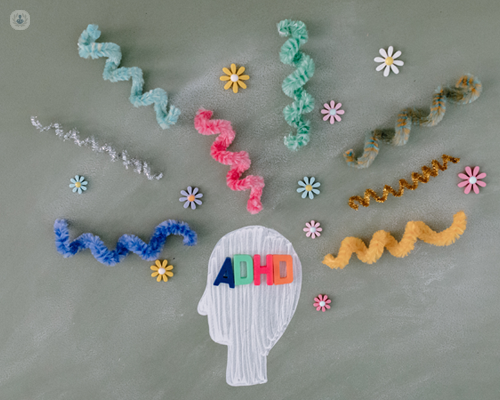TLDR? Living with adult ADHD
Autore:We often imagine children when discussing an ADHD diagnosis. However, it is possible for adults to get diagnosed as well. In this article, expert and highly-skilled consultant paediatric and adult psychiatrist Dr Teresa Gomez Alemany goes into detail about what it’s like to have ADHD as an adult, how it’s diagnosed, and what to expect.

What are the signs and symptoms of ADHD in adults?
ADHD in adults has very similar traits to children, but also has its own nuances in comparison.
In both children and adults, we have three ADHD presentations:
- Attention Deficit presentation: these are patients who find it difficult to sustain attention in one task, get easily distracted, and avoid activities that require sustained mental effort. Almost 90 per cent of adult patients with ADHD show inattentive symptoms, and most of them are females who went undiagnosed during childhood and in adulthood, when there is a greater need of internal structure and more external demand, start having complaints while studying at university or in their job position and that’s when they seek out for help.
- Hyperactivity-Impulsivity presentation: is much less represented in adulthood. However, some adult patients with ADHD do struggle with their impulsive behaviour and it is not infrequent to see ADHD patients who struggle with excessive and impulsive spending, drug abuse or binge eating problems.
- Combined presentation: which is, of course, a combination of the two that we have just mentioned.
One very important point when there is a suspicion of ADHD in adulthood is that symptoms must be present before the age of 12. Also, there needs to have been a period of six months or more with symptoms interfering with functioning in two or more settings of the patient’s life.
What are the specific symptoms of ADHD in adulthood?
Most adult patients search for a psychiatrist after having experienced a slower progression in their career compared to their peers; it takes them longer to get promoted, and their bosses usually have more complaints about their work.
Some patients are able to compensate for their executive dysfunction in younger years due to their high intellectual abilities, however, when they reach higher levels of education such as university, they find their studies extremely difficult and either start failing their exams or do well academically by extending their study hours and out of their general emotional health and well-being.
Their work tends to be either inaccurate with careless mistakes, or they tend to spend too much time reviewing and completing the task with high detail.
They usually state they easily become very bored with things, and need constant change. They are often perceived as being in the clouds, very dreamy, or that their mind seems elsewhere while in conversations, since they get easily distracted by their own thoughts. They are usually told they keep changing the subject of the conversation.
Usually, they have a poor sense of time, need deadlines for tasks, are always late for events, need frequent reminders of their appointments, and they double book different activities at the same time.
They have problems losing things, invest a lot of time searching for things, and have difficulty keeping things in order. They are extremely forgetful, mislay wallet, phones, paperwork, agenda, keys, etc.
Therefore, if you feel as though you may be having any of these symptoms, I would recommend you to seek out a professional to rule out ADHD diagnosis.
What can trigger symptoms of adult ADHD?
As with most psychiatric disorders, ADHD is usually caused by a highly convoluted relationship between both genetics and the environment.
- ADHD can run in families within their genes; it is not uncommon that after one person is diagnosed with ADHD, their closest relatives also become aware that they may, at least, share some of the same traits if not the whole diagnosis.
- However, certain environmental factors may also increase the risk for ADHD. Some examples could be: drug use in pregnancy; premature birth, low birth weight, brain injury but also maternal depression, uninvolved, or neglectful parents or primary caregivers and poverty.
Since COVID, many people are working remotely from their homes, which has led to more social isolation and a completely new daily structure. Patients who had been suffering from ADHD silently have had greater difficulty to reorganise themselves and create a new daily routine at home, and the number of patients requesting ADHD assessment has increased significantly.
Reasons it might be missed:
- Parents with ADHD who normalise the behaviour.
- Attention deficit presentation with little hyperactivity-impulsivity symptoms.
Problems that ADHD can cause if not diagnosed:
- ADHD has been associated with a higher rate of divorce compared to non-ADHD population, risky sexual practices, and early unwanted pregnancies, substance use, relationship difficulties, traffic violations, and car accidents.
- Some research found that drivers with ADHD had a 36 per cent higher risk of crashing compared to peers without ADHD.
Can adult ADHD be misdiagnosed?
Of course, and that is why a careful evaluation should always be set in place.
ADHD can be misdiagnosed when the patient’s native language is different to where the patient is living. She or he may be seen as inattentive but his/her real problem is that he/she is having difficulty in understanding the language. It can also be misdiagnosed when there are comorbidities like autism or anxiety/mood disorders.
Mood disorders can be frequently seen in adults with ADHD since a repeated pattern of failures and frustrations due to lack of difficulties in concentration can lead to depression.
Anxiety disorders should also be taken into the differential diagnosis for ADHD since they could also interfere with the ability to sustain a mental effort or, when the anxiety is expressed as motor hyperkinesia, could also be misdiagnosed as hyperactivity of ADHD.
Specific learning disabilities can also interfere with the ability to perform academically. While adults with ADHD may score lower on academic testing than would be expected for their age, intelligence, and education, these same outcomes could be caused by a learning disability such as dyslexia.
What is the assessment for adult ADHD?
Diagnosis of ADHD in adults has the main requirements of onset symptoms occurring during childhood and followed by a lifelong persistence of these characteristic symptoms up to the point of current evaluation.
The symptoms must be relating to significant clinical or psychosocial impairments that affect the patient in at least two life situations. As ADHD in adults is a lifelong condition starting in childhood, it is essential to evaluate the symptoms, course, and level of associated impairment using a retrospective interview for childhood behaviours or having a separate assessment with a close relative.
My assessments are very comprehensive and I always take into account different perspectives. Considering the DSM-V criteria, I always perform a:
-
clinical interview with the patient and a clinical interview with a close relative to the patient.
-
evaluation of the symptoms in childhood and a developmental interview with the parents.
-
psychometric tests such as Conners Adult ADHD Rating Scale and Comprehensive Executive Function Inventory Adult (CEFI).


